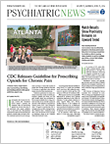DOT Issues New Flight Rule For Electronic-Smoking Devices
The Department of Transportation (DOT) Pipeline and Hazardous Materials Safety Administration last month issued a rule prohibiting passengers and crewmembers from carrying portable electronic smoking devices (for example, e-cigarettes and other electronic nicotine delivery systems) in checked bags. The rule also prohibits passengers and crewmembers from charging the devices and/or batteries on board the aircraft.
“We know from recent incidents that e-cigarettes in checked bags can catch fire during transport,” said Transportation Secretary Anthony Foxx, J.D., in a press release. “Banning e-cigarettes from checked bags is a prudent safety measure.”
The DOT stated that passengers may continue to carry electronic smoking devices for personal use in carry-on baggage or on their person but may not use them on flights.
The department’s current regulatory ban on smoking of tobacco products on passenger flights includes the use of electronic smoking devices. Nevertheless, to prevent passenger or crewmember confusion, the DOT has proposed an amendment to its existing airline smoking policies to explicitly ban use of electronic smoking devices aboard aircraft.
FDA Puts Hold on Trial of Potential Abuse-Deterrent Painkiller
Cara Therapeutics Inc. recently announced that the Food and Drug Administration (FDA) has placed the company’s phase 3 clinical trial of the postoperative intravenous analgesic CR845 on hold pending a safety review.
The trial was stopped, in accordance with the protocol, after four patients in the highest R845 dose group (5 μg/kg) exhibited transient serum sodium levels greater than or equal to 150 mmol/L (mild-to-moderate hypernatremia). All four patients were asymptomatic, and sodium levels resolved to normal levels (less than 146 mmol/L) within 24 hours postdosing with standard fluid management. No patients in the other two dose groups (2 μg/kg and 1 μg/kg) exhibited serum sodium levels greater than 150 mmol/L.
Previous phase 2 clinical trials with CR845 found that the medication reduces postoperative pain intensity and opioid-related side effects in patients who underwent laparoscopic hysterectomy or bunionectomy procedures; it also had a lower potential to be abused than the opioid painkiller pentazocine. CR845 targets the kappa opioid receptor.
Olanzapine May Help Patients in Pain
Olanzapine may be effective in treating pain syndromes, according to data presented at the 2016 Annual Meeting of the American Academy of Pain Medicine.
The systematic review included 18 studies—three randomized, controlled trials and the remainder being case studies and reports—involving the adjunctive use of atypical antipsychotics in patients with various forms of pain (e.g., chronic pain, headache/migraine, pain related to fibromyalgia). Of these 18 studies, 10 examined the effectiveness of olanzapine to reduce pain, four were of quetiapine , two were of aripiprazole , and one each of risperidone and ziprasidone .
The analysis showed that olanzapine was effective in reducing pain stemming from fibromyalgia and headache/migraine, “although only one study was a randomized, controlled trial with level I evidence efficacy,” the researchers reported. All the other antipsychotics, they added, failed to demonstrate efficacy in various pain syndromes and/or lacked robust study designs.
“The collective findings of multiple studies evaluating olanzapine in pain syndromes suggest a high yet preliminary level of efficacy warranting prospective studies in various pain syndrome contexts,” the authors concluded.
Tramadol Found Less Effective Than Amitriptyline As Adjunctive Therapy for MDD
E-Therapeutics plc recently announced disappointing results for its phase 2b trial of ETS6103 , a controlled-released version of the analgesic tramadol. The trial was evaluating the medication as second-line therapy for patients with major depressive disorder (MDD) who have not responded adequately to first-line therapy with a selective serotonin reuptake inhibitor.
The study included 164 patients with MDD who continued to report significant depressive symptoms after six weeks on citalopram. The participants were randomized into one of three study arms: one arm received a high dose of ETS6103, a second received a low dose of ETS6103, and a third received one dose of tricyclic amitriptyline. Patients took the medication once daily for eight weeks.
The results showed that both ETS6103 arms failed overall to achieve the primary endpoint of being as effective as amitriptyline in achieving remission of depressive symptoms, based on obtaining a score of 11 or lower on the Montgomery–Åsberg Depression Rating Scale. ■
